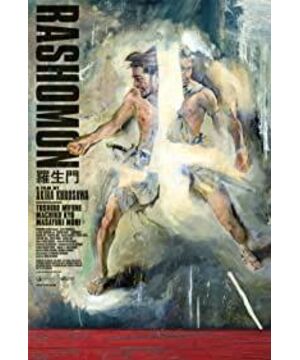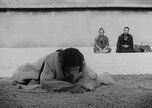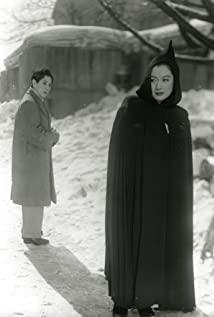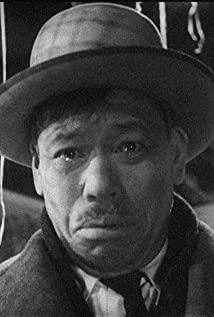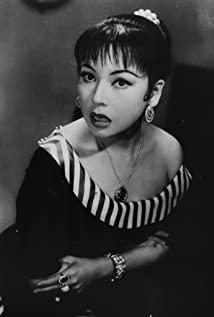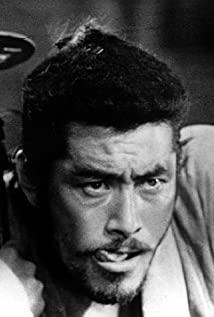This is the third time I have seen it. Still shocked, not tired. At the same time, see some more things.
A broken hall, an old plaque, a heavy rain, a story. Human nature is presented so ugly.
Kurosawa's technique is unique and powerful. Through the woodsman's mouth, the first person to discover the scene of the murder, while avoiding a heavy rain under the dilapidated Rashomon, narrated the whole incident to a passerby. At the same time, there is also a monk in the temple who had a relationship with the person involved in the case.
It was a murder case. The samurai walked the mountains with his wife sitting on the white horse, passing by the monk. Afterwards, the robber lying under the tree was attracted by her beauty when the breeze blew up the woman's veil. He deceived and tied the samurai and raped the woman. The passing woodman hurriedly reported to the officer after finding the samurai's body.
It has been confirmed that it was a robber who killed the samurai. The contradiction is centered on the motive and weapon of murder-whether it is a long sword or a short knife. Everyone's words are perfect. Even the dead warrior's confession through the mouth of the witch of Toling seemed flawless.
The robber did not deny that he killed the samurai. However, the samurai in his mouth was a hero who unfortunately failed in a fierce battle with his sword for more than 20 rounds, and he was a brave and upright man. Surrendering a fierce woman with a short knife in her hand and letting her obediently satisfy her desires is something that makes herself extremely proud and proud.
The woman confessed the humiliation of being raped and claimed that after that, her husband, the samurai's cold indifference to it caused her suffering. So she drew a short knife and let the samurai kill herself. But he fainted excessively due to grief, and when he woke up, he found a short knife and fork on the samurai's chest. I want to die but I don't have the guts. The robber at this time has long disappeared.
The samurai asked the maiden to tell another scene: the robber raped his wife in front of him. Then he saw his wife turn to follow the robber and asked the robber to kill him. He was furious. At this time, the robber overthrew the woman and expressed disdain, and asked the samurai what to do with her. The samurai forgave the robber in his heart, but could not tolerate his wife's viciousness. With a curse and resentment towards her, the samurai griefly drew a short knife and died by laparotomy. The woman and the robber, including the short knife, were gone.
The rain outside the Rashomon Temple was still torrential. Lumberjacks, monks and passers-by are still waiting for the rain to stop under the eaves. Wind and rain are like the fierce collision of the woodsman's inner thoughts. He finally spoke, telling the truth of the facts he had seen with his own eyes.
After the robber has raped a woman, he can comfort him in every way as long as she is willing to go with him. She couldn't decide, she wanted her husband and the robber to fight by force, and she would follow the winner. However, the samurai is cowardly. He expressed his unwillingness to risk his life for her, and he asked his wife: "You make a fool of yourself in front of two men, why don't you commit suicide?!" At this moment, the robber said: "Don't treat her like this. They are not men, they can't restrain crying because they are weak." And the woman instantly understood how shameless and weak her husband is. She asked him why he was unable to protect his wife as a samurai, and ridiculed the robbers in every possible way. Under her instigation, the two men finally drew their swords and started a decisive battle. However, how messy and disorganized the two postures and swordsmanship are, and there is no spirit at all. The death of the samurai was only accidental. When the robber turned around, the woman was gone.
That's the way it is. But why is the woodcutter unwilling to tell the truth? He said he did not want to be involved in the case. In fact, it was just because of his temporary greed that he secretly took the valuable knife. The incident he intended to conceal was exposed by the passerby who listened to him.
"People just think that they are honest." "Where there is weakness, there are lies." The passers-by said everything is reasonable, and the monk on one side sighed: "Even people can't believe it, what else can they believe?" Then the passerby said that it was originally. That's it. The ghosts near Rashomon thought people were too scary, so they didn't come.
The video is here, it's almost the end. However, the real reason for each insistence is the phrase "where there is weakness, there are lies." The robber wants to show that he must be upright even if he kills. The woman tries to conceal the fact that she is not chaste and to instigate two men. The duel resulted in the fact that his husband was killed in an unfavorable manner. Even though the samurai used the witch's mouth, he intended to conceal his weakness and incompetence, but the woodcutter was reluctant to tell the truth, only trying to hide the fact that he secretly took the knife. Human nature is presented in such a dark and naked manner. It is better to say that each sticking to one's own "needs"-the weakness that each needs to cover up.
However, thinking deeper, the robber’s words described the samurai as a powerful man with a force comparable to his own. In the samurai’s words, he described the robber as a man with masculinity, and he forgave him in the end. . However, the two people faced the same woman. One claimed that she had turned from Zhenlie to a submissive lewdness, and the other stated her viciousness after lewdness—the sympathy between men turned to contempt and ridicule for women. But in fact, the only woman saw their stubbornness and cowardice clearly, showing a strong side. In this case, she did not say all this in her testimony, and still appeared in a humiliated and unjustified posture. She may be afraid and unable to tell the truth. Kurosawa's arrangement may also be intended to express the low status of Japanese women in the early 1950s and the strong patriarchy. Even so, the consciousness of awakening has gradually awakened in women's hearts, just as the woman in this film realized the weakness and incompetence of the samurai at the last moment.
At the same time, from a historical point of view, Japan in the early 1950s was also a period when the old and new right wing was replaced after the Showa period. From the beginning of the film, in the torrential rain, the monks and woodcutters narrated the political background of the time-the turmoil of the army, the turmoil of the times, and the lack of livelihood of the people. A samurai, a robber, the realm of the two should be very obvious. However, throughout the film, we see the cowardice and rogue of the samurai, as well as the unfeeling, indifference and contempt for his wife. Although the robber raped the woman, he never denied the crime with him from the beginning, and when the woman was humiliated by the samurai, he said something like this: "Don't treat her like this, they are not men, they can't restrain themselves. They cry because they are weak.” Although there is a patriarchal element in it, compared with the cowardly samurai, the sharp contrast between the real villain and the hypocrite makes the viewer understand from the heart that Kurosawa intends to reveal and satirize Japan. At that time, the spirit of Bushido had existed in name only, and it was no longer as good as a mountain bandit. At the end of the film, of course, the rain stopped. Although the sky is still thick with clouds, there is finally golden sunlight coming out. In the faint sunlight, the woodcutter slowly left with a newborn baby, and the monk finally saw the sincere side of human nature that still existed. After narrating the cowardice and deceit of human nature for more than eighty minutes, Kurosawa gave everyone a golden and beautiful hope at the end.
Looking back, it is true that where there is weakness, there is deception. However, where does weakness come from? Going back, the robber said this sentence when he first narrated the words he had arranged: "It's just a breeze. Without that breeze, maybe the man wouldn't die." Yes, that gust of wind. He lifted the veil of the woman on the horseback and blew up the hem of her soft skirt. Then he saw her white ankles, her pure face under her veil. So everything happened. It was just a breeze that blew up his most fundamental and primitive desires. Then, it is pure desire, which creates the weakness of everyone's heart, and constructs the illusion that everyone uses lies to try to show. There are so many dark and unspeakable secrets buried in the deepest part of people's hearts. Under the dim and shabby Rashomon, where ghosts were afraid, the truth came to light in the soft sunlight.
A breeze is blowing all the time, like endless desire. And how often does the gloomy Rashomon in everyone's heart clear up again? This may be another question Kurosawa left in the film.
http://www.blogcn.com/user5/vivianisvivian/blog/1766738.html
View more about Rashomon reviews


